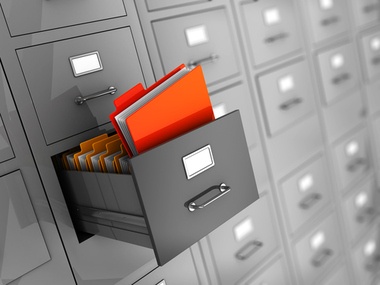The dreaded filing, piling up on your desk, in your filing tray, on top of the filing cabinet, anywhere except where it is meant to be. Why does such a simple task that requires very little brain power cause such distress in most people? Filing is one of the top jobs that most people procrastinate on.
Of late I have been trying to simplify my life, moving gradually towards a more minimalist approach and in the process I decided to work from a smaller desk. I reckoned that if there was less desk space to put things on and less drawers space to put things in, it would help me to minimize. It has helped to a certain degree. It forced me to purge all my drawers and only keep the essentials. What also happened was that I had to move my small filing box to a different location, about ten steps from my desk — no longer within arm’s reach of my chair.
The result — which has rather amazed me: I accumulated a large pile of filing.
Lesson 1: Keep your filing cabinet/box very close by
If you can’t file a document with ease when you finish with it, it is more likely that you will place it in a filing tray than stand up and file it correctly. Most of us have busy schedules and standing up to file one piece of paper would be considered a bad use of time, therefore we let the filing accumulate until there is enough to justify the trip to the filing cabinet. The problem with that is that the bigger the pile gets, the bigger the job appears and we avoid and avoid because (in reality) there are more important jobs to be done. By having the filing cabinet within reach, you eliminate this potentiality. It’s easy and quicker to file on the spot so you get into better habits.
But in order to be able to file swiftly and efficiently, you must adhere to the second lesson…
Lesson 2: Label all your files clearly
This is a part of the puzzle a lot of people resist. Most people will hand-write labels for their hanging files, thinking it is faster and as clear. Sometimes they write with black pen, sometimes with blue, sometimes ALL IN UPPER CASE and sometimes not — and if you are lucky a black marker will be used.
Even if you have a system for writing all your labels with black marker in ALL IN UPPER CASE, your files will still not be as easy to find as those that have been created by a labeler. A labeler has a clear, consistent typeset. You may argue this until you are blue in the face…but the labeler works. It is well worth the minor investment. When folders are clear and with your cabinet close by, you will be able to file as you go (as long as you don’t have too many files or folders).
Lesson 3: Purge filing regularly
It is widely recognized that an overfilled filing cabinet is detrimental to your health. If you are trying to squeeze a document into an overloaded folder which is also in an overloaded filing cabinet, it won’t end well.
Set a date and time once every couple of months to purge older documents. Find out local regulations about how long you must keep documents for tax and legal purposes. Minimize the amount of paper you possess and only hold on where absolutely necessary. If your paperwork is weighing you down — you could also try paperless.
Lesson 4: Explore the possibility of paperless
It has become quite popular of late to go paperless. You will hear many organizations proudly state that they are a paperless office or a paperless organization. This means that documents are not printed out but rather that documents come in paper format and then are scanned into the computer for filing.
The challenge with a paperless system is to ensure that the electronic documents are filed for easy retrieval. A clear and simple hierarchical filing system should be used, combined with a strong search facility on your computer.
Lesson 5: Keep it simple
Keep your categories simple and don’t overcomplicate. David Allen recommends a simple A-Z filing system, which works well if you have a lot of filing.
In my home office I don’t have too many files, so I am happy to file by category. For example, I have a Home file where my insurance documents and facilities documents are filed in separate manilla folders, and a Car file where my car insurance, car taxes and other related documents go. Remember the goal of your system is to have easy and fast retrieval — so see what works best for you.
Stick to these rules and never stress over an overcrowded filing tray again. A no-stress clutter-free desk awaits you.
Do you have any filing tips you’d like to share? Feel free to do so in the comments below.
(Photo credit: 3D Illustration of Information via Shutterstock)













































